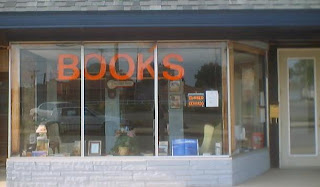The other day a woman brought in an exquisite Bible that she had read from as a child with her grandfather. He had passed it on to her, and for a long time she had thought she would pass it on to her child or grandchild. Then she heard the buzz about a market for books and came to ask, "Would you tell me how much this book is worth?"
 Like other precious stones, metals, antiques and collectibles, fine books almost always appreciate in value. They are a good investment, with less risk than the stock market. Even for the average reader, there is still a thrill to be had in finding that one title by a favorite author, or upgrading a book in one's collection from paperback to hardback.
Like other precious stones, metals, antiques and collectibles, fine books almost always appreciate in value. They are a good investment, with less risk than the stock market. Even for the average reader, there is still a thrill to be had in finding that one title by a favorite author, or upgrading a book in one's collection from paperback to hardback.Part of the joy of hunting books is the hope and possibility of stumbling upon a signed first edition, dusty in an attic, or a forbidden classic bound up within a mundane treatise on manure. Though such buried treasures do exist, waiting to be discovered, there are also gems lying everywhere, like diamonds on the beach. I recently picked up a 1960s edition of a companion book to a fictional series that so many others had passed, and sold it the next day for fifteen times what I had paid, which was most certainly still below its high-end value.
How does this happen? Well, to be sure much of it has to do with the competition. The internet has given rise to hordes of book scouts and dealers in search of an easy profit. Many of them join the hunt armed with bar code scanners, which, of course, don't work on pre-ISBN books, and so they ignore many opportunities. Many others specialize, and those who are looking for religion, or military history, or children's books will again pass right by historical fiction, or not know what they are seeing when they look.
How can you find those gems? First, by trusting intuition. Yes, you will often be wrong, yet you will often be right. Intuition, after all, is usually a manifestation of an accumulation of knowledge, just as luck is usually putting oneself in the right situation at the right time. I once acquired a book at nominal cost, though I knew nothing about it, merely because it was thick and in fine condition. Several months later I sold it for 125 times my cost. And a few months before that sale I found another copy of the same book, though at a higher price, and having learned its true value, bought and resold that one within days for twice what I paid. Second, overlook nothing. The dealer in religious books may not have any use for historical fiction, but she can trade for something she can use. Many times books will wander away from their categories and end up among others not like themselves. And the little unmarked items look inconspicuous, but are sometimes the easiest to find, precisely because they are so easily overlooked. I know of a dealer who regularly sells old paperback romance novels for prices that have three digits before the decimal.
In our shop, some of the books we offer are purposely underpriced, offering the diligent book hunter the discovery of unexpected treasure. Dollars, though, can never wholly measure a book's value. Browsing for something you didn't know you wanted is also a great way to turn up hidden gems of writing that don't adorn the bestseller lists, yet still sparkle in one's mind when read. And finding another copy of the rather common Christopher Morley books Parnassus on Wheels and The Haunted Bookshop still stirs excitement in this collector. Gems are everywhere.
When someone says, "Would you tell me how much this book is worth?" the correct answer can only ever be a measure of its value to the owner.

No comments:
Post a Comment